Page 3 – 20
On The BOOKS

Death of Innocence: The Story of the Hate Crime That Changed America – Mamie Till-Mobley (Author) Christopher Benson (Author) The mother of Emmett Till recounts the story of her life, her son’s tragic death, and the dawn of the civil rights movement–with a foreword by the Reverend Jesse L. Jackson, Sr. In August 1955, a fourteen-year-old African American, Emmett Till, was visiting family in Mississippi when he was kidnapped from his bed in the middle of the night by two white men and brutally murdered. His crime: allegedly whistling at a white woman in a convenience store. The killers were eventually acquitted. What followed altered the course of this country’s history–and it was all set in motion by the sheer will, determination, and courage of Mamie Till-Mobley, whose actions galvanized the civil rights movement, leaving an indelible mark on our racial consciousness. Death of Innocence is an essential document in the annals of American civil rights history and a painful yet beautiful account of a mother’s ability to transform tragedy into boundless courage and hope. Praise for Death of Innocence “A testament to the power of the indestructible human spirit [that] speaks as eloquently as the diary of Anne Frank.”–The Washington Post Book World “With this important book, [Mamie Till-Mobley] has helped ensure that the story of her son (and her own story) will not soon be forgotten. . . . A riveting account of a tragedy that upended her life and ultimately the Jim Crow system.”–Chicago Tribune “The book will . . . inform or remind people of what a courageous figure for justice [Mamie Till-Mobley] was and how important she and her son were to set the stage for the modern-day civil rights movement.”–The Detroit News “Poignant . . . In his mother’s descriptions, Emmett becomes more than an icon; he becomes a living, breathing youngster–any mother’s child.”–Pittsburgh Post-Gazette “Powerful . . . [Mamie Till-Mobley’s] courage transformed her loss into a moral compass for a nation.”–Black Issues Book Review Robert F. Kennedy Book Award Special Recognition – BlackBoard Nonfiction Book of the Year

Take a drive through the Mississippi Delta today and you’ll find a landscape dotted with memorials to major figures and events from the civil rights movement. Perhaps the most chilling are those devoted to the murder of Emmett Till, a tragedy of hate and injustice that became a beacon in the fight for racial equality. The ways this event is remembered have been fraught from the beginning, revealing currents of controversy, patronage, and racism lurking just behind the placid facades of historical markers.
In Remembering Emmett Till, Dave Tell gives us five accounts of the commemoration of this infamous crime. In development no one could have foreseen, Till’s murder—one of the darkest moments in the region’s history—has become an economic driver for the Delta. Historical tourism has transformed seemingly innocuous places like bridges, boat landings, gas stations, and riverbeds into sites of racial politics, reminders of the still-unsettled question of how best to remember the victim of this heinous crime. Tell builds an insightful and persuasive case for how these memorials have altered the Delta’s physical and cultural landscape, drawing potent connections between the dawn of the civil rights era and our own moment of renewed fire for racial justice.
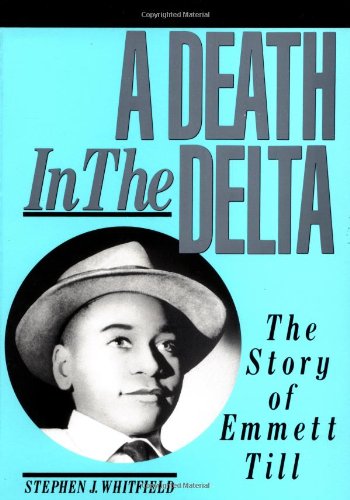
In this sensitive inquiry, historian Stephen J. Whitfield probes Till’s death; its ideological roots; the potent myths concerning race, sexuality, and violence; and the incident’s enduring effects on American national life. In August 1955, the mutilated body of Emmett Till―a fourteen-year-old Black Chicago youth―was pulled from Mississippi’s Tallahatchie River. Abducted, severely beaten, and finally thrown into the river with a weight fastened around his neck with barbed wire, Till, an eighth-grader, was killed for allegedly whistling at a White woman. The nation was horrified by Till’s death. When the all-White, all-male jury hastily acquitted the two white defendants, the outcry reached a frenzied pitch―spurring a fury that would prove critical in the mobilization of Black resistance to White racism in the Deep South. In this sensitive inquiry, historian Stephen J. Whitfield probes Till’s death; its ideological roots; the potent myths concerning race, sexuality, and violence; and the incident’s enduring effects on American national life. As he recreates the trial, its participants, and the social structure of the Delta, Whitfield examines how White rural Mississippians actually tried “two of their own.” Though they were acquitted, these same defendants were soon being ostracized by their own neighbors, and within four months of Till’s death, Southern Blacks were staging the historic Montgomery bus boycott―the first major battle in the coming war against racial injustice that would lead to the passage of civil rights legislation a decade later.

Murder in The Delta: The Emmett Till Story
by Michael Joseph Miller
Published Apr 07, 2016.
A wolf-whistle, a brutal murder, a movement ignited.
Emmett Till, a fourteen-year-old Black youth from the South Side of Chicago traveled to Money, Mississippi for a summer vacation. It was 1955; racial tensions were extremely reprehensible in the South. During his visit, the youth became embroiled in a wolf-whistle incident with a white woman, which led to his brutal murder. The atrocity of Emmett Till’s lynch/murder set off a chain reaction that emerged as the vanguard event which catapulted one of the most extensive civil rights movements in U.S. History.
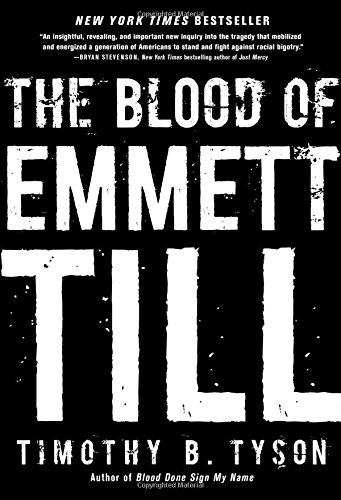
The Blood of Emmett Till Hardcover – January 31, 2017
by Timothy B. Tyson (Author).
This extraordinary New York Times bestseller reexamines a pivotal event of the civil rights movement—the 1955 lynching of Emmett Till—“and demands that we do the one vital thing we aren’t often enough asked to do with history: learn from it” (The Atlantic).
In 1955, white men in the Mississippi Delta lynched a fourteen-year-old from Chicago named Emmett Till. His murder was part of a wave of white terrorism in the wake of the 1954 Supreme Court decision that declared public school segregation unconstitutional. Only weeks later, Rosa Parks thought about young Emmett as she refused to move to the back of a city bus in Montgomery, Alabama. Five years later, Black students who called themselves “the Emmett Till generation” launched sit-in campaigns that turned the struggle for civil rights into a mass movement. Till’s lynching became the most notorious hate crime in American history.
But what actually happened to Emmett Till—not the icon of injustice, but the flesh-and-blood boy? A part detective story, part political history, The Blood of Emmett Till “unfolds like a movie” (The Atlanta Journal-Constitution), drawing on a wealth of new evidence, including a shocking admission of Till’s innocence from the woman in whose name he was killed. “Jolting and powerful” (The Washington Post), the book “provides fresh insight into the way race has informed and deformed our democratic institutions” (Diane McWhorter, Pulitzer Prize-winning author of Carry Me Home) and “call us to the cause of justice today” (Rev. Dr. William J. Barber, II, president of the North Carolina NAACP).
On FILM
The Untold Story Of Emmett Louis Till (Official Trailer)
Keith A. Beauchamp (Director)
On August 19th, 1955, one day before Till went to visit his uncle Wright in Mississippi, his mom gave him the ring of Till’s father (Louis Till), which later became the key to identifying the dead body. On the next day, Mrs. Till said goodbye to her son without knowing that was the last time she saw the boy alive.
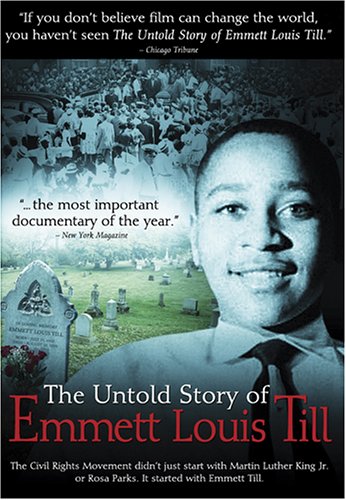
TILL WE’RE FREE (Emmett Till movie)
J.W. Milam – Sean Baligian
Roy Bryant – Alan Canning
John Whitten – Harry Wetzel
William Bradford Huie – Paul Lang
Mamie Till – Chevonne Wilson
Emmett Till – Ben Will
“Too-Tight” – Henry Frost III
Mose Wright – Roberto Warren
Elizabeth Wright – Lulu Dahl
Carolyn Bryant – Leah Smith
Juanita Milam – Jessica Danley
Leslie – Craig Bentley
Elmer – Bob Liegl
Ruthie May – Alana Walker
Simeon Wright – Tai Terry
Maurice Wright – Miles Bond
Henry – Blake Moss
Osa – Nardo Gilliam
Hubert – Stephen Sussman
Melvin – Marc Myers
A.A. Raynor – Anthony E. McNeil
Gene Mobley – Shawn L. Neal
Father – Eddie Caldwell
Son – Blake Osley
Willie Reed – Craig Oliver
Amandy Bradley – Debra White-Hunt
Secretary – Anna Fleury
Oudie Brown – Jalen Spight
Cornfield Victim – Edward “Eddie” Dunbar II
Boy with Shoe – Malchi Bradford
Wolf Whistle – Jason Kupser
Toddler Voice in Store – Canyon Pietro
Boy on Bike – Stephen Holland
Director – Denn Pietro
Writer – Director
Producers – Rita Liegl & Stephanie Shum
Director of Photography – Walter Lin
KILLING OF EMMETT TILL (2020)
a film by Denn Pietro
KILLING OF EMMETT TILL tells the shocking confession of two brothers acquitted for the murder of a 14-year-old boy for whistling at a white woman in 1955 – but they didn’t tell the whole truth.
Let the World See

The docuseries chronicles Ms. Mamie Till-Mobley’s fierce quest for justice that sparked the civil rights movement after her son Emmett Till’s brutal murder, inspiring heroes like Ms. Rosa Parks and others to stand up boldly for their rights.
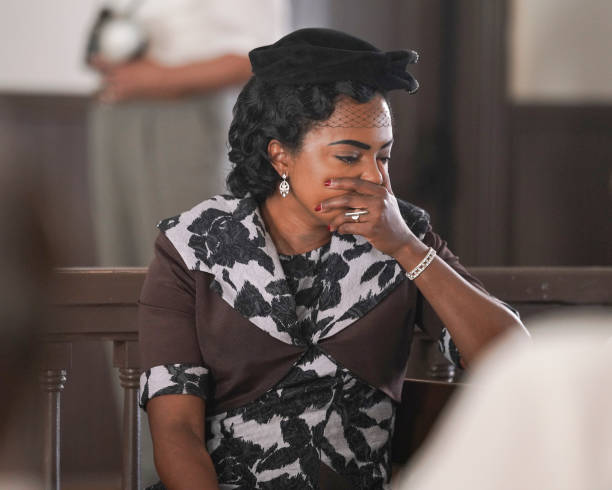
WOMEN OF THE MOVEMENT – “Mothers and Sons” – The two mothers at the center of the Emmett Till murder, Carolyn Bryant and Mamie Till-Mobley, testify about his character in front of a packed courtroom. The season finale of “Women of the Movement” airs THURSDAY, JAN. 20 (8:00-10:31 p.m. EST), on ABC. (James Van Evers/ABC via Getty Images)
ADRIENNE WARREN
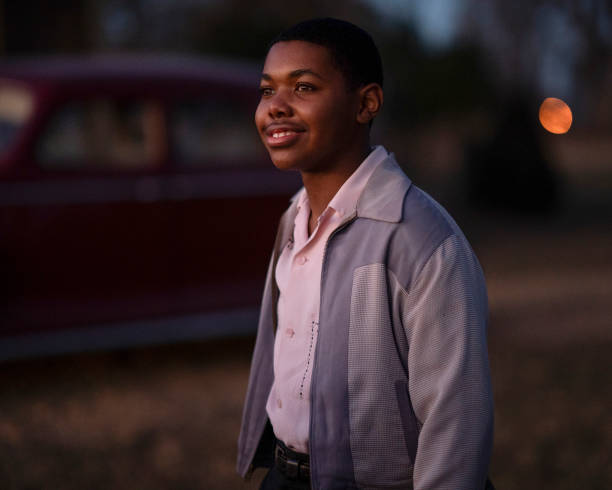
WOMEN OF THE MOVEMENT – The six-episode series Women of the Movement will air in three parts beginning THURSDAY, JAN. 6 (8:00-10:00 p.m. EST), for three consecutive weeks on ABC. The series is based on the true story of Mamie Till-Mobley, who in 1955 risked her life to find justice after her son Emmett was brutally murdered in the Jim Crow South. (Eli Joshua Ade/ABC via Getty Images)
CEDRIC JOE
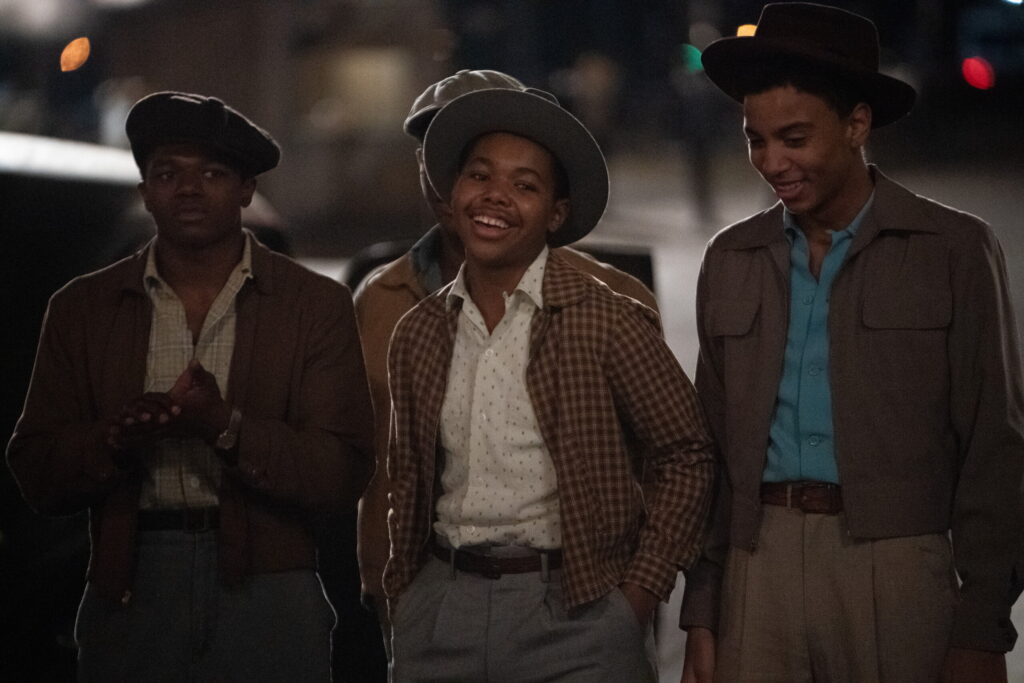
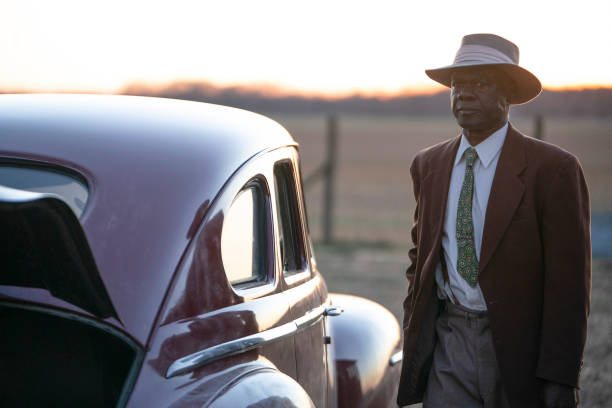
WOMEN OF THE MOVEMENT – The six-episode series Women of the Movement will air in three parts beginning THURSDAY, JAN. 6 (8:00-10:00 p.m. EST), for three consecutive weeks on ABC. The series is based on the true story of Mamie Till-Mobley, who in 1955 risked her life to find justice after her son Emmett was brutally murdered in the Jim Crow South. (Eli Joshua Ade/ABC via Getty Images)
GLYNN TURMAN

nypost.com
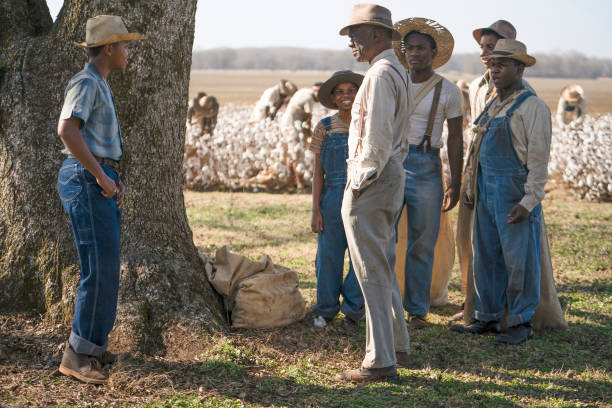
WOMEN OF THE MOVEMENT – The six-episode series Women of the Movement will air in three parts beginning THURSDAY, JAN. 6 (8:00-10:00 p.m. EST), for three consecutive weeks on ABC. The series is based on the true story of Mamie Till-Mobley, who in 1955 risked her life to find justice after her son Emmett was brutally murdered in the Jim Crow South. (Eli Joshua Ade/ABC via Getty Images)
WOMEN OF THE MOVEMENT

WOMEN OF THE MOVEMENT – “The Last Word” – After the verdict is reached and the story becomes international news, a movement begins – and Mamie Till-Mobley fights to defend Emmett’s legacy. The season finale of “Women of the Movement” airs THURSDAY, JAN. 20 (8:00-10:31 p.m. EST), on ABC. (James Van Evers/ABC via Getty Images)
TONYA PINKINS, ADRIENNE WARREN
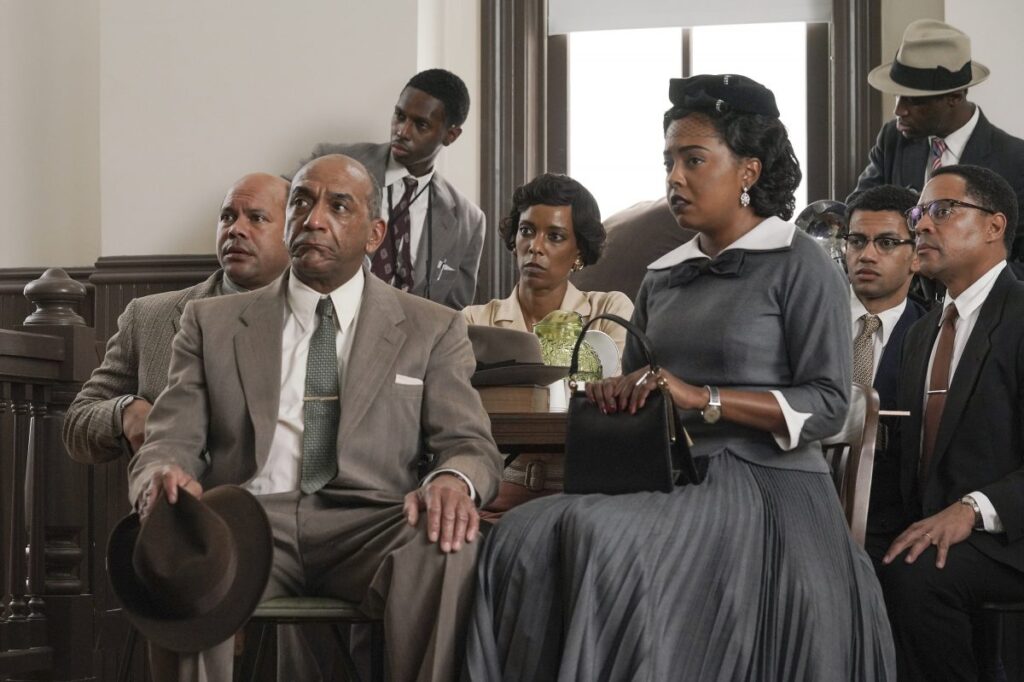
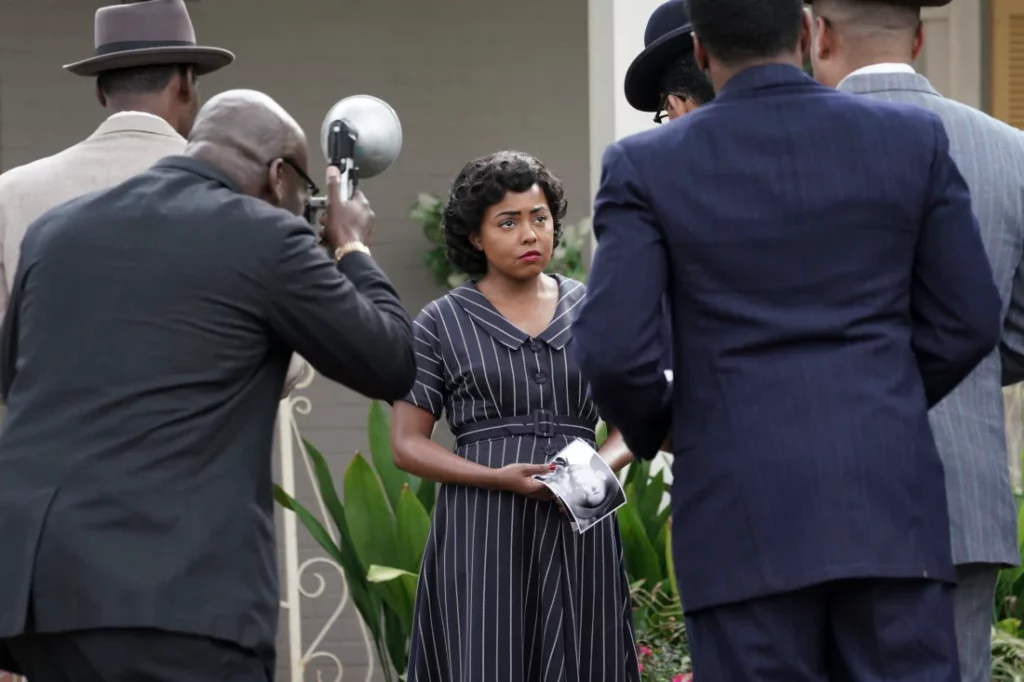
PHOTO: ABC/ELI JOSHUA ADE – Adrienne Warren on the set of Women of the Movement.
TILL
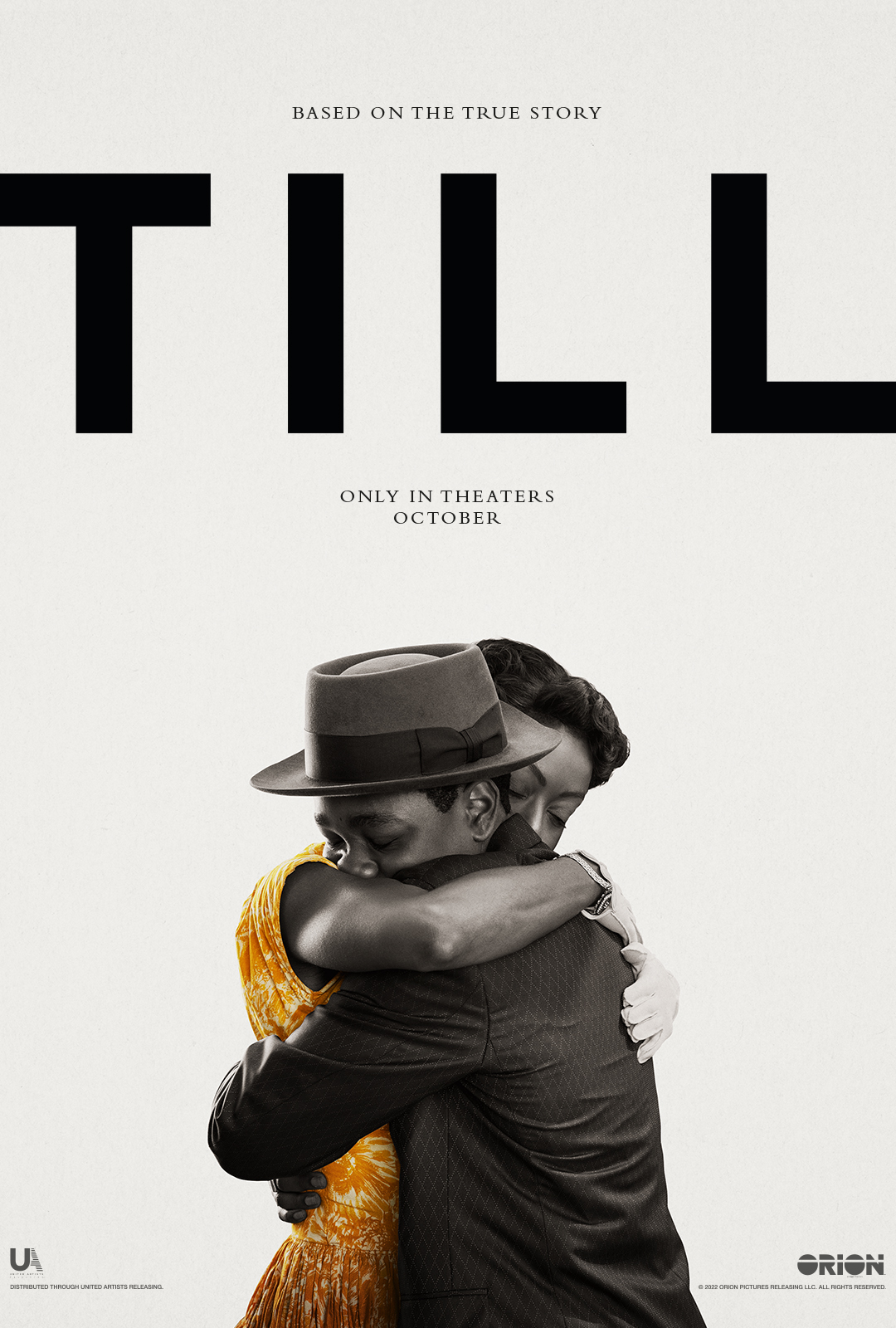
Till is a profoundly emotional and cinematic film about the true story of Mamie Till Mobley’s relentless pursuit of justice for her 14-year-old son, Emmett Till, who, in 1955, was lynched while visiting his cousins in Mississippi. In Mamie’s poignant journey of grief turned to action, we see the universal power of a mother’s ability to change the world.
Cast
Danielle Deadwyler as Mamie Till
Jalyn Hall as Emmett Till
Frankie Faison as John Carthan, Mamie Till’s father and Emmett’s grandfather
Haley Bennett as Carolyn Bryant, a Southern shopkeeper whose accusations led to Emmett’s murder.
Whoopi Goldberg as Alma Carthan, Mamie Till’s mother, and Emmett’s grandmother.
Jayme Lawson as Myrlie Evers, a Civil Rights activist, and Medgar’s wife.
Tosin Cole as Medgar Evers, a Civil Rights activist, and Myrlie’s husband.
Kevin Carroll as Rayfield Mooty
Sean Patrick Thomas as Gene Mobley
John Douglas Thompson as Moses Wright
Roger Guenveur Smith as Dr. T. R. M. Howard
Produced by
Keith Beauchamp, p.g.a.
Barbara Broccoli, p.g.a.
Whoopi Goldberg
Thomas Levine
Michael Reilly
Fredrick Zollo, p.g.a.
Story by
Michael Reilly
Keith Beauchamp
Chinonye Chukwu
Directed by
Chinonye Chukwu

Till is a 2022 biographical drama film directed by Chinonye Chukwu, written by Michael Reilly, Keith Beauchamp, and Chukwu, and produced by Beauchamp, Reilly, and Goldberg. It is based on the true story of Mamie Till, an educator and activist, who pursued justice after the lynching of her 14-year-old son Emmett Till, in 1955. The film stars Danielle Deadwyler, Jalyn Hall, Frankie Faison, Haley Bennett, and Whoopi Goldberg.
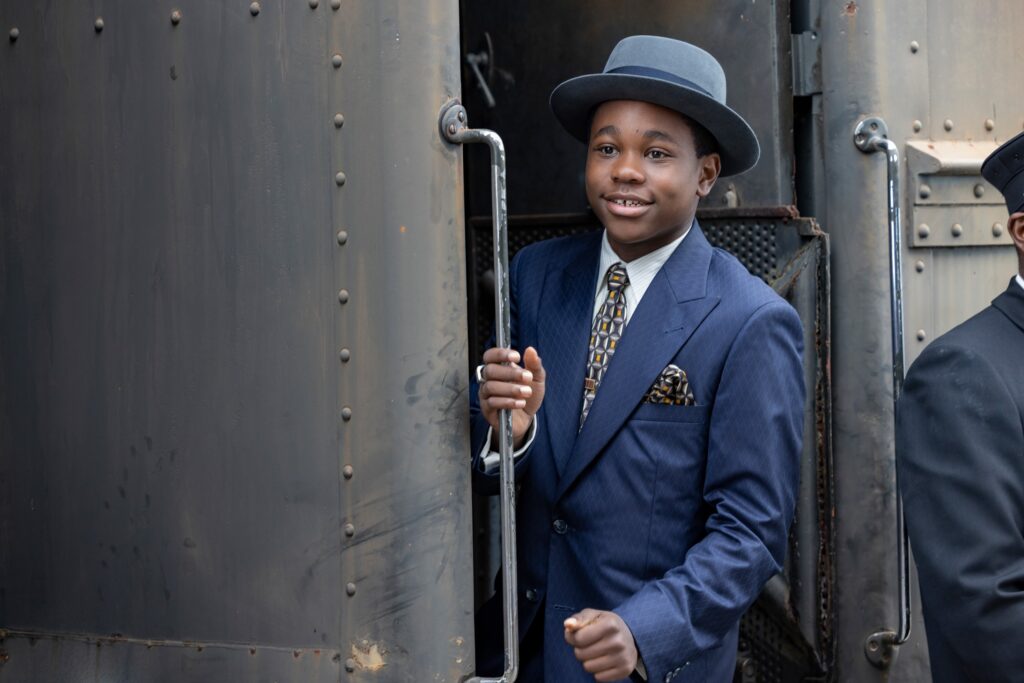
Jalyn Hall as Emmett Till in TILL, directed by Chinonye Chukwu, released by Orion Pictures.
Credit: Lynsey Weatherspoon / Orion Pictures
© 2022 ORION RELEASING LLC. All Rights Reserved.
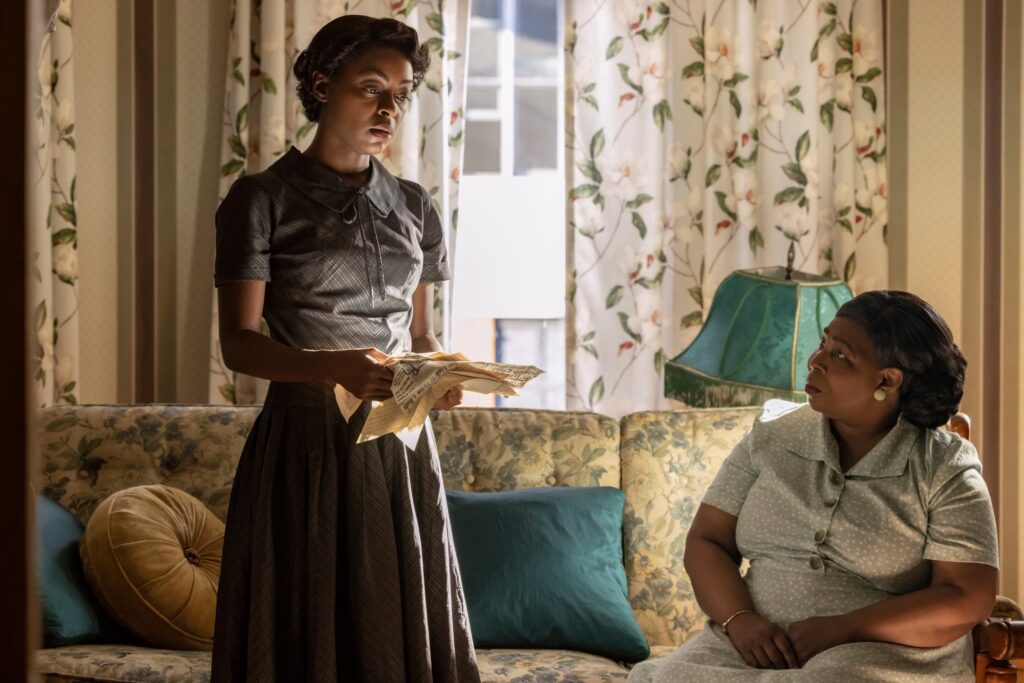
(L to R) Danielle Deadwyler as Mamie Till Mobley and Whoopi Goldberg as Alma Carthan in TILL, directed by Chinonye Chukwu, released by Orion Pictures.
Credit: Lynsey Weatherspoon / Orion Pictures
© 2022 ORION PICTURES RELEASING LLC. All Rights Reserved.
Till had its world premiere at the New York Film Festival on October 1, 2022, was released in the United States on October 14, 2022, by United Artists Releasing, and is scheduled to be released in the United Kingdom on January 13, 2023, by Universal Pictures. The film received positive reviews from critics, with Deadwyler’s performance being universally praised.
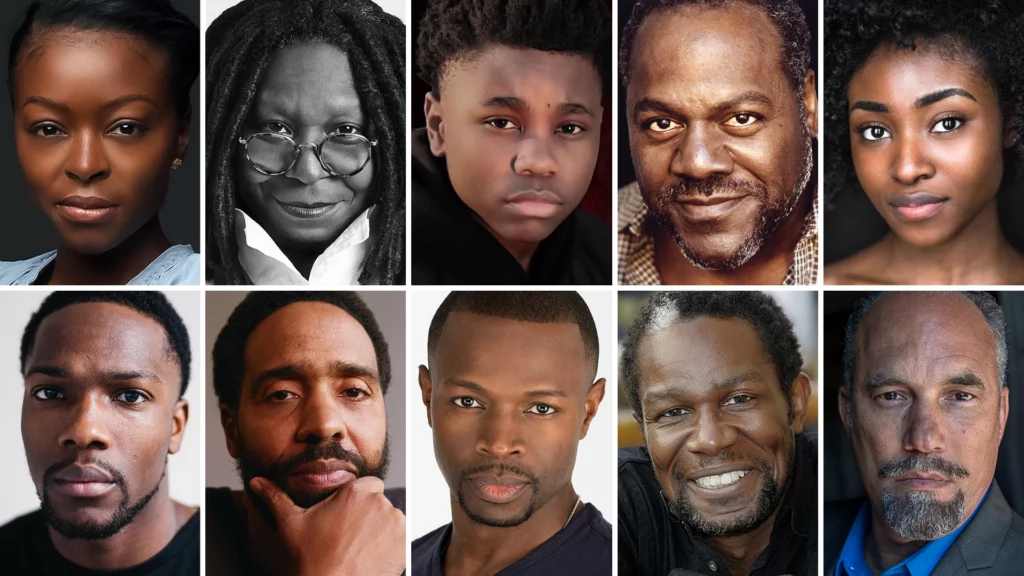
On STAGE
Goodman Theatre
Chicago, IL (2008)
A World Premiere
The now legendary story of Emmett Till is believed by many to be the start of the modern civil rights movement of the 1950s and remains one of the most pivotal incidents in a monumental era. This world premiere, part history, and part ghost story is a jazz integration of past and present, the living and dead, factual accounts, and creative interpolation. Chicago author Ifa Bayeza captures the powerful truths at the heart of the story, creating a soaring work of music, brilliant poetry, and theatricality.
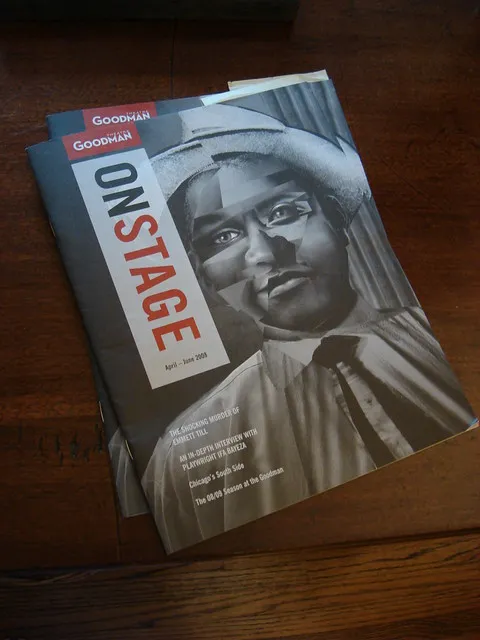
The Ballad of Emmet Till
by Ifa Bayeza
directed by Oz Scott
Goodman Theatre, Chicago,IL
G.W. (Skip) Mercier- set, puppet, and costume designer.
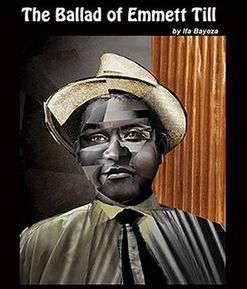
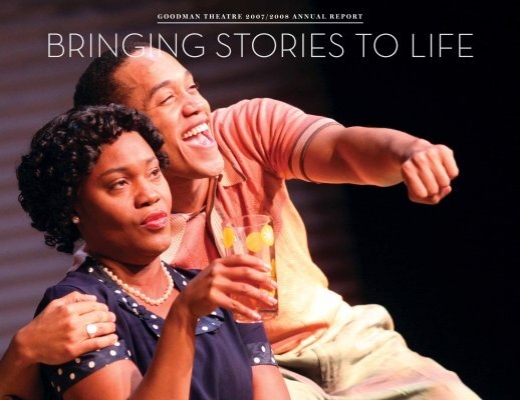


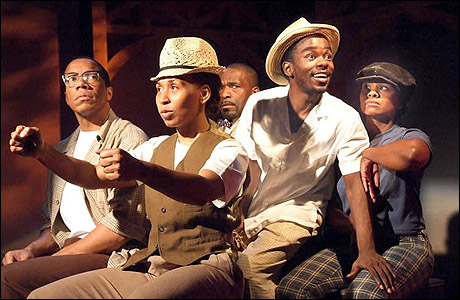
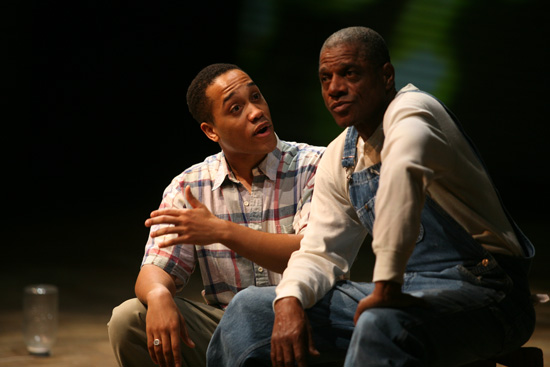
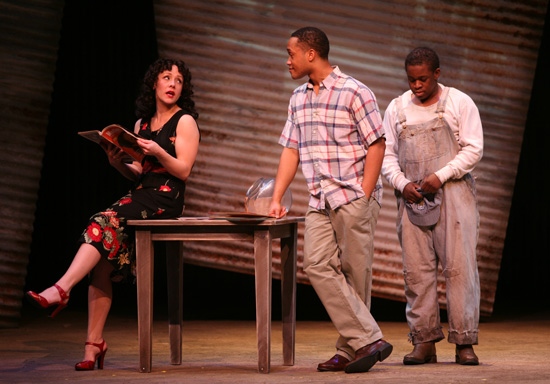

By IFA BAYEZA, Directed by OZ SCOTT CAST KAREN ALDRIDGE – Lizabeth Wright / Sistuh Mary / Ruby Hurley KIRK ANDERSON – Attorney J.J. Breedland / Elmer Kimbrell PHILLIP JAMES BRANNON – Maurice Wright / Too Tight Collins / Willie Reed JOSEPH ANTHONY BYRD – Emmett “Bo” Till CLIFF CHAMBERLAIN – Roy Bryant / Judge Curtis M. Swango DEIDRIE HENRY – Mamie Till-Bradley KRISTINA JOHNSON – Caroline Bryant NAMBI E. KELLEY – Ruthie May Crawford / Amanda Bradley BRIAN MCCASKILL – Special Prosecutor Robert Bruce Smith / Leslie Milam MOROCCO OMARI – Wheeler Parker / Dr. T.R.M. Howard/ H.L. Loggins SAMUEL G. ROBERSON, JR. – Simeon Wright / Jimmy Hicks CHRIS SULLIVAN – J.W. Milam / Sheriff Strider JOHN WESLEY – Mose Wright / B.J. Washington CREATIVE TEAM AND CREW G.W. MERCIER – Scenic Design MYRNA COLLEY-LEE – Costume Design VICTOR EN YU TAN – Lighting Design RICHARD WOODBURY – Sound Design KATHRYN BOSTIC – Composer JOHN BOESCHE – Projection Design NICK SANDYS – Fight Consultant TANYA PALMER – Dramaturg ADAM BELCUORE – Casting JOSEPH DRUMMOND – Production Stage Manager T. PAUL LYNCH – Stage Manager
The opera is produced in association with Opera Noire International and The Harlem Chamber Players.
BY MARGARET HALL
MARCH 07, 2022
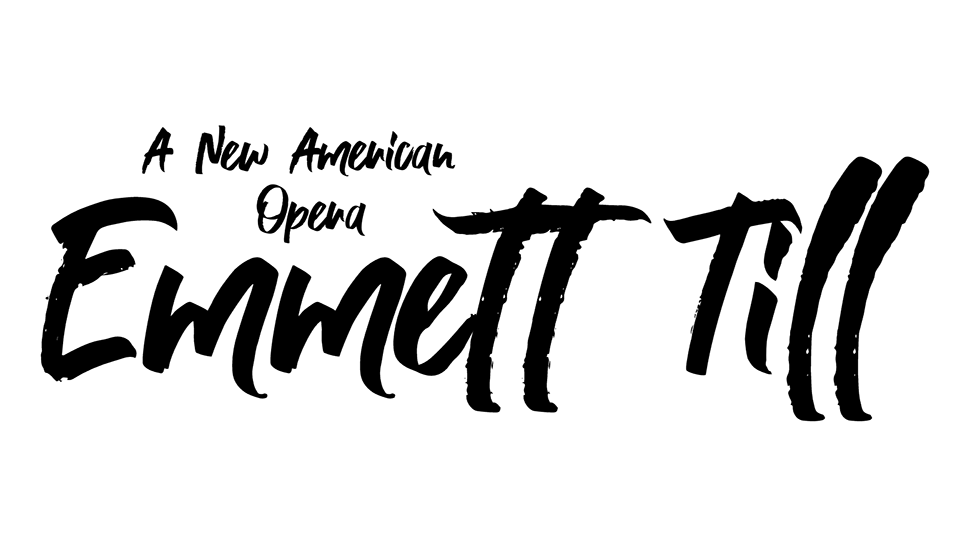
“Emmett Till, A New American Opera, conceived by white playwright and librettist Clare Coss and composer Mary D. Watkins, will have its world premiere on March 23 with an encore performance on March 24 at the Gerald W. Lynch Theatre at John Jay College. Both performances begin at 7 PM. The production is co-presented by John Jay College, Opera Noire International, The Harlem Chamber Players, and Harlem Arts Alliance.
The opera will star mezzo-soprano Lucia Bradford as Mamie Till, tenor Robert Mack as Emmett Till, mezzo-soprano Abigail Wright as Roanne Taylor, soprano Amanda Rose Austin as Carolyn Bryant, baritone Justin Ryan as Roy Bryant, contralto Karmesha Peake as Aunt Lizzy, and baritone Markell Reed as Maurice Wright. Malcolm Merriweather serves as chorus master, with Kyle Walker as rehearsal pianist.
Conducted by 2021 Pulitzer Prize winner Tania León, the production centers around the murder of Emmett Till and explores themes of social justice, the flaws within the justice system, white silence and allyship, racial inequality, and the complexities of the human experience.
Based on Coss’ award-winning 2013 play Emmett, Down in My Heart, the opera reimagines the events around the tragic murder of Till, a 14-year-old African-American boy from Chicago who was lynched in Mississippi in 1955. Following his mother’s brave decision to have an open casket funeral so that the world would see what was done to her son, the lynching of Emmett Till became a catalyst for the Civil Rights movement and stands as a turning point in the racial reckoning of this country.
In the opera, the story is approached through the lens of Roanne Taylor, a young white woman who teaches high school science in Drew, Mississippi. Roanne is against Jim Crow laws, segregation, and the racial inequality that she sees around her but remains silent. She is the opera’s only fictional character and represents what Martin Luther King Jr. called the ultimate tragedy, “the silence of the good people.”
Featuring both a Black Chorus and a white Chorus, Emmett Till weaves the horrific murder of Till with Mamie Till-Mobley’s transformation from private citizen to activist, Uncle Mose Wright’s bold decision to break the Delta code and testify at the trial, and Roanne Taylor’s journey toward a sense of responsibility.
The story of Emmett Till has a personal significance for Coss who was attending Louisiana State University at the time and was haunted by his murder. Decades later, she was compelled to find a way to honor his mother’s ongoing fight to “keep telling Emmett’s story.”
“Emmett Till was murdered not far upriver from where I was a junior at Louisiana State University in Baton Rouge,” shares Cross. “No one in my largely white world would talk about what happened, a child brutally tortured and lynched—the breakdown of justice. White supremacy and Jim Crow ruled. Over the years, the pain of Emmett’s murder continued to plague my heart. In 1992, I awoke one morning with a spiritual mandate to write a play about Emmett Till. I approached writing about him through my conviction that this tragedy is shared, in the way the tragic history of this country is shared. White people as perpetrators and witnesses of white supremacy have a stake in this story. I want people to understand that it was not so long ago. Emmett Till is in our lifetime. He is in MY lifetime. I want people to understand the grave parallels between the world over 60 years ago to today’s world, from Emmett Till to Trayvon Martin to Daunte Wright. It is still happening and we must continue to shed light on these stories. I am reminded of Mamie Till-Mobley’s words, ‘The world must see what was done to my son. The world must help me tell the story.’ And so we will.”
After the debut of the play, Emmett, Down in My Heart, Coss was encouraged by musician friends Lucille Field and Patsy Rogers to translate the play into a libretto. They introduced Coss and Watkins and, together, the two began their creative journey, followed by five years of development, workshops, and three sing-throughs to bring the opera to life. For Watkins, this project is also intensely personal and has been a labor of love:
“Setting music to Clare’s Emmett Till libretto has been an exciting challenge for me,” says Watkins. “I remember when Emmett Till was murdered, and the horror and sadness of it affected me so deeply. I grew up in Colorado yet knew first-hand about discrimination. The difference between my southern sisters and brothers and me was that I was one Black person among 50 or 60 white people at any given time every day of the week except Sunday. I lived in a white neighborhood where some of my neighbors were blatant racists…and I dealt with that pain through drawing, storytelling, and music. I never expected that I would write an opera about Emmett Till’s lynching, but I am deeply grateful that I have been given this opportunity to examine one of the great tragedies of the 20th century. I am an eclectic composer, and this opera has given me the space to exercise a wide range of musical expression to establish empathy for the characters and the complex emotional texture of the period.”
https://playbill.com/article/emmett-till-a-new-american-opera-to-premiere-at-john-jay-college
Whose song is this to sing? A new opera about Emmett Till faces scrutiny and protest.
Critics of the collaboration between a Black composer and a White librettist say they’ve heard enough.

Composer, Mary D. Watkins, left, and librettist, Clare Coss, right, pose for a portrait at Ripley-Grier Rehearsals in New York, NY on March 17, 2022.
Nate Palmer
[ “But the production, with two, sold out shows on March 23 and 24, is drawing criticism. An online petition is urging the show be canceled, saying Coss centered the play around her “white guilt…her white self and her white feelings” and that she is “more concerned with showing the audience that ‘not all White people are bad’ than she is with the ongoing fight for racial justice.”More than 12,000 people have signed online petitions.
“White perspectives should not be centered in the stories of lynched Black children,” said John Jay student Mya Bishop. “That’s not my only problem with the play … It is still unacceptable to generate profit from the likeness of a deceased child, and that child’s now-deceased mother, both of whom are unable to receive justice.”
Watkins said she’s proud to work with Coss on this production.
“I think it’s very interesting and important that it is a White woman and a Black woman, and we’re pretty much in the same age group. We both were alive when this happened and we’ve seen a lot,” she said.” ]
“The show focuses on Till’s mother and a fictional character the creator said is “a white woman who represents the people who care but are silent” — but opponents say the creator is “more concerned with showing the audience that ‘not all White people are bad'”
On RECORD
The Death of Emmett Till by Bob Dylan
Not so long ago
When a young boy from Chicago Town
Walk in a southern door
This boy’s fateful tragedy
We should all remember well
The color of his skin was Black
And his name was Emmett TillSome men they dragged him to a barn
And there they beat him up
They said they had a reason
But I disremember what
They tortured him and did some things
Too evil to repeat
There was screamin’ sounds inside the barn
There was laughin’ sound out on the street They dragged his body to a gulch
Amidst a bloodred rain
And they threw him in the waters wide
To cease his screaming pain
The reason that they killed him there
And I’m sure it ain’t no lie
He was a Black skin boy
So he was born to die And so to stop these United States
Of yelling for a trial
Two brothers they confessed that they
Killed poor Emmett Till
But on the jury there were men
Who helped the brother commit this awful crime
And so this trial was a mockery
But nobody seemed to mind saw the morning paper
But I could not bear
To see the brothers smiling
On that courthouse stairs
For the jury found them innocent
And the brothers they went free
Whilt Emmett’s body floats the foam
Of a Jim Crow southern seaIf you can’t speak out against this kind of thing
A crime that’s so unjust
Your eyes are filled with deadman’s dirt
Your mind is filled with dust
Your arms and legs, they must be in shackles and chains
And your blood it must cease to flow
For you’d let this human race
Sink so God-awful low
This song is just a reminder
To tell my fellow man
That this kind of thing still lives today
In that ghost-robed Klu Klux Klan
But if we all then think alike
If we give all we can give
We’d make this Great land of ours
An even greater place to live.
Bob Dylan – Death Of Emmett Till
@ ALL RIGHTS RESERVED – Iforcolor.org/Dale Shields
NO COPYRIGHT INFRINGEMENT INTENDED


